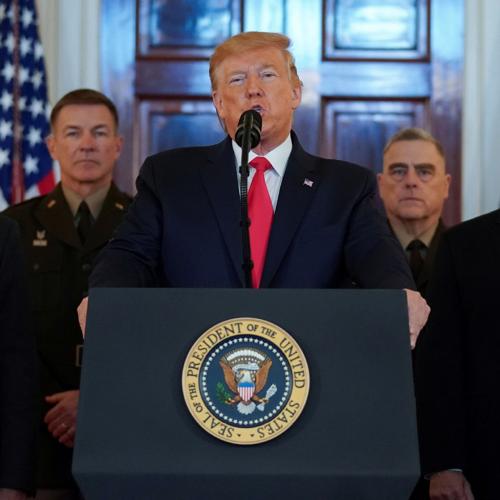



US President Donald Trump doubled down threats on Iran on Wednesday, vowing to impose additional sanctions and never to allow Tehran to have a nuclear weapon, but also offered a peaceful gesture.
"As long as I am president of the United States, Iran will never be allowed to have a nuclear weapon," Trump began his nine-minute televised remarks from the White House with the stark statement.
Trump said the Iranian missile strikes on bases in Iraq on Tuesday night in retaliation of the US killing of its top military commander caused no casualties to US troops stationed there and damage was minimal.
He noted that Iran appeared to be standing down, which is a "good thing" for all parties concerned.
"As we continue to evaluate options in response to Iranian aggression, the United States will immediately impose additional punishing economic sanctions on the Iranian regime," Trump said, adding the sanctions will stay until Iran changes its behavior.
Trump described the Joint Comprehensive Plan of Action (JCPOA), also known as the Iran nuclear deal, as "very defective", which "expires shortly anyway, and gives Iran a clear and quick path to nuclear breakout".
Following the US drone killing of Iranian general Qassem Soleimani in Baghdad last Friday, Iran said on Sunday it would scrap limits on enriching uranium, a further step back from commitments under JCPOA.
The agreement, under which Tehran curbed its uranium enrichment capacity to win sanctions relief in return, was signed by Iran with Britain, China, France, Germany, Russia and the United States in 2015. Washington quit the landmark deal in May 2018 and reinstalled sanctions.
Trump asked the signatories to recognize the reality and break away from the remnants of the Iran deal and work for a new deal with Iran.
But on Wednesday, one of the signatories, Britain, said it believes the Iranian nuclear deal remains the best way to prevent Iran from developing a nuclear weapon.
"It is our view that the JCPOA remains the best way of preventing nuclear proliferation in Iran, the best way of encouraging the Iranians not to develop a nuclear weapon," Reuters quoted Prime Minister Boris Johnson as saying on Wednesday.
On Monday, Moscow urged all the signatories to create conditions for reviving the nuclear deal. "We are firmly calling on all the partners to stay within the JCPOA course and create conditions for resuming its stable implementation," Russian Foreign Ministry said in a statement.
Trump also touted US military strength, saying, "Our missiles are big, powerful, accurate, lethal, and fast. Under construction are many hypersonic missiles." He added that American military and economic strength is the "best deterrent".
He said he would ask NATO to become "much more involved" in the Middle East.
Trump ended his speech by saying the United States is "ready to embrace peace" with all who seek it.
Following the strike on US military bases in Iraq, Iranian Foreign Minister Mohammad Javad Zarif tweeted that the country had "concluded proportionate measures in self-defense".
"Iran took & concluded proportionate measures in self-defense under Article 51 of UN Charter targeting base from which cowardly armed attack against our citizens & senior officials were launched," Zarif tweeted. "We do not seek escalation or war, but will defend ourselves against any aggression."
Xinhua contributed to this story.
If you have any problems with this article, please contact us at app@chinadaily.com.cn and we'll immediately get back to you.